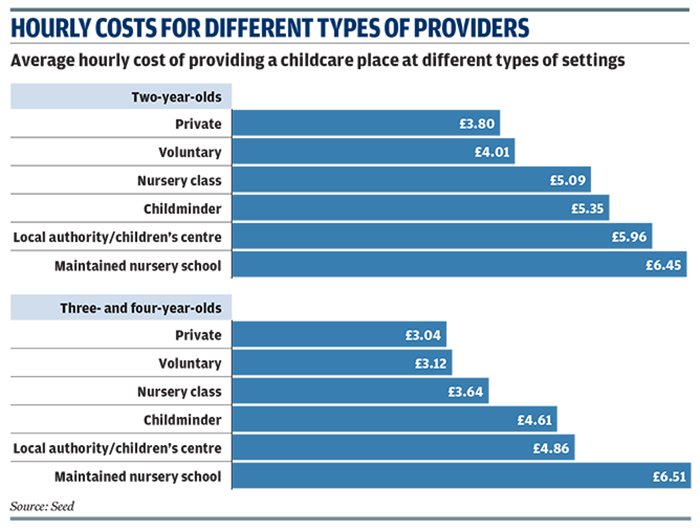Research Report: Study of Early Education and Development: Cost and Funding
Charlotte Goddard
Tuesday, February 28, 2017
This research report aims to address questions about the cost and funding of early education policy.
Authors Sam Blainey and Gillian Paull, Frontier Economics
Published by Department for Education, January 2017
Download Study of Early Education and Development: Cost and Funding
SUMMARY
The Study of Early Education and Development (Seed) is an eight-year research project undertaken by NatCen Social Research, the University of Oxford, Frontier Economics, and the charity 4Children, which has now ceased operating. The study is due for completion in 2020, and this report is the first from the "value for money" strand of the research, aiming to address questions about the cost and funding of early education policy. Researchers visited 166 providers and collected data using face-to-face interviews.
The researchers found the average setting costs £4,747 a week to run. Weekly costs are lowest for childminders at £797 while maintained nursery schools have the highest costs at £11,144. Other providers include children's centres (£9,178), private settings (£6,307), voluntary-run settings (£4,116) and nursery class settings (£3,243).
On average, 75 per cent of costs are for staff, while 12 per cent are venue-related. The average cost per child per hour across all settings is £4.58 for under-twos, £4.30 for two-year-olds, and £3.72 for three- and four-year-olds. There is considerable variation in hourly costs across settings, and the results suggest there are a small number of unusually high-cost settings. Average hourly costs for two- to four-year-olds are higher for maintained nursery schools, children's centres and childminders, than for nursery classes, private and voluntary settings. Nursery classes have higher hourly costs than private settings.
Small settings have a higher average hourly cost than bigger ones. Settings that only look after three- and four-year-olds, or only two- to four-year-olds, have a higher hourly cost than those which also look after schoolchildren or children under the age of two.
On average, 48 per cent of revenue is derived from fees paid by parents, 49 per cent from the free early education entitlement, and three per cent from other sources. For private providers and childminders most revenue comes from parental fees, and for voluntary and maintained providers most revenue comes from the free childcare entitlement. Only 16 per cent of settings receive more than 10 per cent of their revenue from other sources, which include the early years pupil premium - received by a quarter of settings, funding for children with special educational needs and disabilities (23 per cent) and fundraising (21 per cent).
The average parental hourly fee for two-year-olds is £4.25 and the average hourly free entitlement rate is £4.92, meaning on average settings receive 67p more per hour for funded children. When it comes to three- and four-year-olds the average parental fee is £4.34 and the average funded rate is £3.90, so on average settings are losing 44p per hour on funded children.
The researchers suggest parents of older children are effectively subsidising the places of younger children, as the average relative proportion of costs paid by children under the age of two is 86 per cent, but this is 98 per cent for two-year-olds, and 103 per cent for three- and four-year-olds.

IMPLICATIONS FOR PRACTICE
The key cost driver is the cost of staffing but researchers say greater efficiency in the use of staff time, such as higher occupancy rates, offers greater potential to cut costs than reductions in already low staff salaries. The researchers say the evidence shows considerable variation in the costs of delivering the free early education entitlement, suggesting some provision may offer better value for money than others.
FURTHER READING
Cost of Delivering the Early Education Entitlement, Nigel Lloyd and Ray Easton, published by Department for Education, November 2015. Research carried out by NLH Partnership exploring the costs to private, voluntary and independent providers of delivering the free early education entitlement for two-, three- and four-year-olds.
Review of Childcare Costs: The Analytical Report, Department for Education, November 2015. A government review of the early education and childcare sector.
Counting the Cost: An Analysis of Delivery Costs for Funded Early Years Education and Childcare, Ceeda, October 2014. A study tracking costs for the delivery of 186,712 hours of early years education and childcare for 5,635 funded and non-funded children in 100 early years settings.




